DS Automobiles DS 3 vs Mercedes EQA – Differences & prices compared
Compare performance, boot space, consumption and price in one view.
Find out now: which car is the better choice for you – DS Automobiles DS 3 or Mercedes EQA?
The DS Automobiles DS 3 (SUV) comes with a Electric or Petrol MHEV engine and Automatic transmission. In comparison, the Mercedes EQA (SUV) features a Electric engine with Automatic transmission.
When it comes to boot capacity, the DS Automobiles DS 3 offers 350 L, while the Mercedes EQA provides 340 L – depending on how much space you need. If you’re looking for more power, decide whether the 156 HP of the DS Automobiles DS 3 or the 292 HP of the Mercedes EQA suits your needs better.
In terms of consumption, the values are 15.50 kWh5 L per 100 km for the DS Automobiles DS 3, and 14.40 kWh for the Mercedes EQA.
Price-wise, the DS Automobiles DS 3 starts at 28300 £, while the Mercedes EQA is available from 44200 £. Compare all the details and find out which model fits your lifestyle best!
DS Automobiles DS 3
The DS 3 stands out in the compact hatchback segment with its chic design and distinctive styling, making it a popular choice for those seeking a blend of elegance and individuality. Inside, the car boasts a premium interior that emphasizes comfort and cutting-edge technology, creating a delightful driving experience. With its agile handling and spirited performance, the DS 3 is not just about looks; it delivers on the road, ensuring a fun ride for enthusiasts and casual drivers alike.
details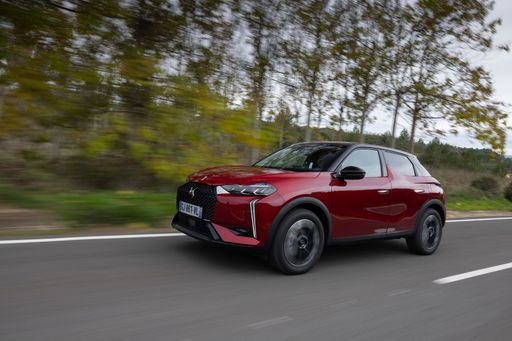 @ media.stellantis.com
@ media.stellantis.com
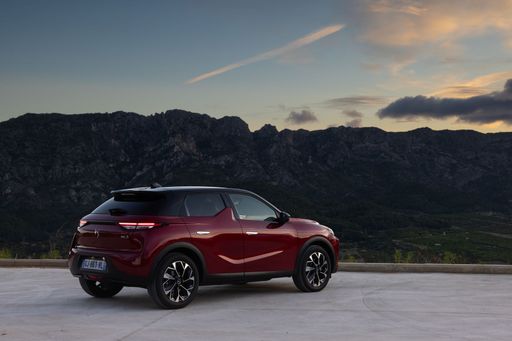 @ media.stellantis.com
@ media.stellantis.com
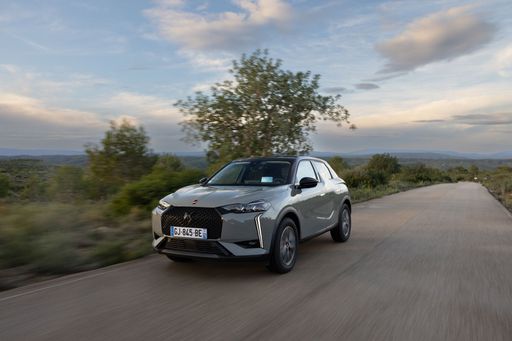 @ media.stellantis.com
@ media.stellantis.com
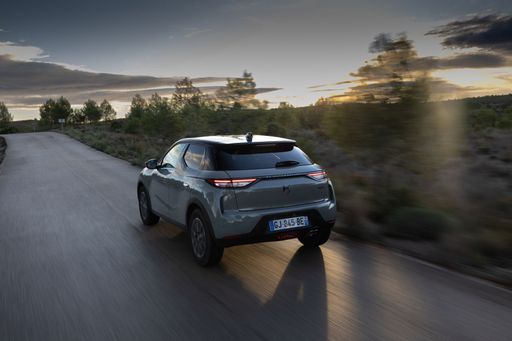 @ media.stellantis.com
@ media.stellantis.com
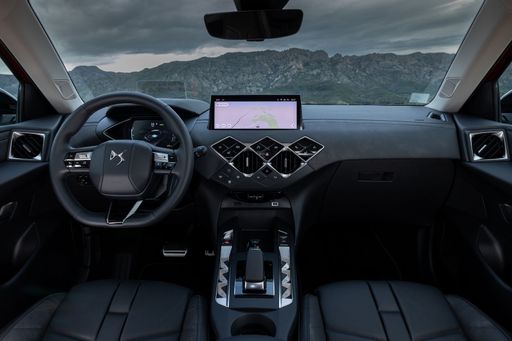 @ media.stellantis.com
@ media.stellantis.com
Mercedes EQA
The Mercedes-Benz EQA presents a refined blend of elegance and electric performance, perfectly suited for urban environments. Its sleek and modern design emphasises aerodynamic efficiency while providing a sumptuous interior that epitomises luxury and comfort. With advanced technology seamlessly integrated into its user-friendly interface, the EQA ensures a connected and enjoyable driving experience.
details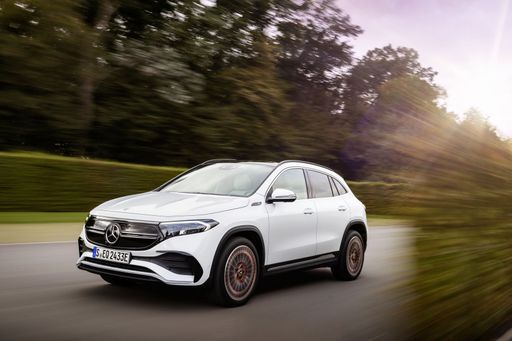 @ group-media.mercedes-benz.com
@ group-media.mercedes-benz.com
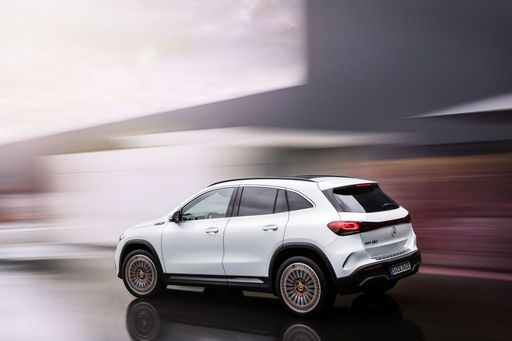 @ group-media.mercedes-benz.com
@ group-media.mercedes-benz.com
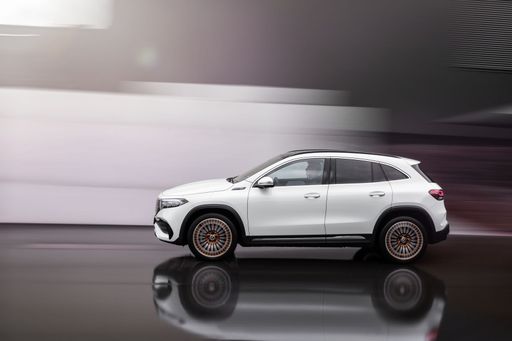 @ group-media.mercedes-benz.com
@ group-media.mercedes-benz.com
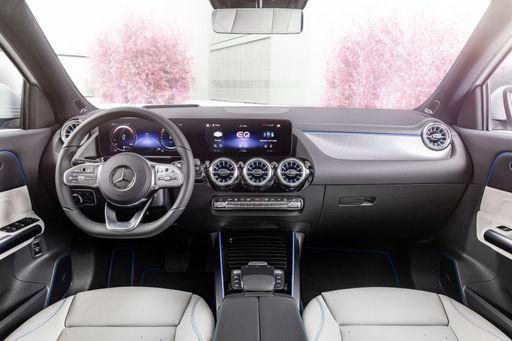 @ group-media.mercedes-benz.com
@ group-media.mercedes-benz.com

|

|
|
|
|
Costs and Consumption |
|
|---|---|
|
Price
28300 - 40500 £
|
Price
44200 - 57400 £
|
|
Consumption L/100km
5 L
|
Consumption L/100km
-
|
|
Consumption kWh/100km
15.50 kWh
|
Consumption kWh/100km
14.4 - 16.9 kWh
|
|
Electric Range
400 km
|
Electric Range
476 - 561 km
|
|
Battery Capacity
51 kWh
|
Battery Capacity
70.50 kWh
|
|
co2
0 - 112 g/km
|
co2
0 g/km
|
|
Fuel tank capacity
44 L
|
Fuel tank capacity
-
|
Dimensions and Body |
|
|---|---|
|
Body Type
SUV
|
Body Type
SUV
|
|
Seats
5
|
Seats
5
|
|
Doors
5
|
Doors
5
|
|
Curb weight
1249 - 1646 kg
|
Curb weight
2045 - 2115 kg
|
|
Trunk capacity
350 L
|
Trunk capacity
340 L
|
|
Length
4118 mm
|
Length
4463 mm
|
|
Width
1791 mm
|
Width
1834 mm
|
|
Height
1534 mm
|
Height
1608 - 1613 mm
|
|
Payload
362 - 466 kg
|
Payload
425 kg
|
Engine and Performance |
|
|---|---|
|
Engine Type
Electric, Petrol MHEV
|
Engine Type
Electric
|
|
Transmission
Automatic
|
Transmission
Automatic
|
|
Transmission Detail
Dual-Clutch Automatic
|
Transmission Detail
-
|
|
Drive Type
Front-Wheel Drive
|
Drive Type
Front-Wheel Drive, All-Wheel Drive
|
|
Power HP
145 - 156 HP
|
Power HP
190 - 292 HP
|
|
Acceleration 0-100km/h
9.1 - 9.2 s
|
Acceleration 0-100km/h
6 - 8.6 s
|
|
Max Speed
150 - 196 km/h
|
Max Speed
160 km/h
|
|
Torque
230 - 260 Nm
|
Torque
385 - 520 Nm
|
|
Number of Cylinders
3
|
Number of Cylinders
-
|
|
Power kW
107 - 115 kW
|
Power kW
140 - 215 kW
|
|
Engine capacity
1199 cm3
|
Engine capacity
-
|
General |
|
|---|---|
|
Model Year
2024 - 2025
|
Model Year
2024 - 2025
|
|
CO2 Efficiency Class
A, C
|
CO2 Efficiency Class
A
|
|
Brand
DS Automobiles
|
Brand
Mercedes-Benz
|
DS Automobiles DS 3
An Overview of the DS 3: Style Meets Innovation
The DS 3, a standout model from DS Automobiles, continues to captivate automotive enthusiasts with its sophisticated design, advanced technology, and a range of powertrain options. This compact SUV strikes a perfect balance between luxury and practicality, making it a popular choice among city dwellers and adventure seekers alike.
Design and Comfort
The DS 3's exterior is characterized by its bold and dynamic lines, giving it an athletic stance on the road. With dimensions of 4118 mm in length, 1791 mm in width, and 1534 mm in height, the DS 3 exudes a confident presence. The distinctive grille and innovative LED lighting elements not only enhance its aesthetic appeal but also improve visibility during nighttime driving.
Inside the cabin, the DS 3 reflects the brand's commitment to luxury. High-quality materials and elegant finishes abound, creating a comfortable and immersive environment. With five seats and ample trunk space of 350 liters, the DS 3 is designed to accommodate both passengers and luggage effortlessly. The ergonomic layout of controls ensures drivers have a pleasurable experience behind the wheel.
Engine Options and Performance
The DS 3 offers a variety of powertrains, catering to different driving preferences and environmental considerations. The diesel variant, the DS 3 BlueHDi 130, delivers a respectable 130 HP and boasts a fuel consumption of just 5.2 L/100 km, making it an efficient choice for long-distance journeys. For those inclined towards petrol, the DS 3 MHEV 136 provides a punchy 136 HP while maintaining low emissions, making it suitable for urban driving.
Moreover, the electric DS 3 E-Tense is a game changer, generating 156 HP and featuring a range of up to 400 km on a single charge, thanks to its 15.5 kWh battery. This model reflects the industry's movement towards sustainable mobility without compromising on performance, with a 0-100 km/h acceleration time of just 9.1 seconds. The advanced automatic gearbox across all variants ensures smooth and efficient transitions between gears, enhancing the overall driving experience.
Innovative Technology and Features
Incorporating cutting-edge technology, the DS 3 is equipped with an array of features designed to enhance safety and connectivity. The infotainment system is intuitive and supports various connectivity options, enabling drivers to stay connected on the go. Advanced driver-assistance systems, including adaptive cruise control and lane-keeping assist, make the driving experience not just enjoyable but also safer.
Additionally, the vehicle's CO2 efficiency ratings vary by model, with the E-Tense version achieving an impressive 0 g/km, making it the ideal choice for eco-conscious drivers. The attention to detail in both design and technology showcases DS Automobiles' dedication to providing a premium automotive experience.
Conclusion: The Future of Urban Mobility
Overall, the DS 3 stands out in the crowded compact SUV market with its combination of stylish design, innovative technology, and versatile powertrain options. Whether you are looking for a fuel-efficient diesel, a smooth petrol hybrid, or a fully electric experience, the DS 3 manages to cater to diverse preferences while maintaining an upscale feel. As automotive development moves towards sustainability, the DS 3 is well-positioned to remain a top contender in urban mobility solutions.
Mercedes EQA
An Introduction to the Mercedes-Benz EQA: A Glimpse of the Future
The Mercedes-Benz EQA stands at the forefront of automotive innovation, representing a harmonious blend of luxury, performance, and sustainability. As part of the prestigious EQ range, this all-electric SUV embodies the essence of modern electromobility. In this article, we delve into the technical sophistication and innovative features of the EQA that make it a standout choice in the electric vehicle market.
Under the Bonnet: Powertrain and Performance
The Mercedes-Benz EQA offers a versatile range of specifications to cater to various preferences and requirements. From the agile front-wheel-drive models to the more robust all-wheel-drive versions, the EQA provides a wide spectrum of power outputs ranging between 190 PS and 292 PS. This impressive power comes alongside an efficient energy consumption of 14.4 to 16.9 kWh/100km, offering an electric range of up to 561 km, making it suitable for both city commutes and longer journeys.
Intelligent Design and Efficiency
Designed to achieve optimal aerodynamics, the EQA's exterior combines elegance with efficiency. Its streamlined dimensions feature a length of 4,463 mm, a width of 1,834 mm, and a height ranging from 1,608 to 1,613 mm. The adaptive use of materials ensures a competitive gross weight of 2,045 to 2,115 kg while maintaining a remarkable 0 g/km CO2 emission, indicative of its commitment to sustainable driving.
Interior Comfort and Technological Innovation
Inside, the EQA is designed to offer maximum comfort and state-of-the-art technology. It accommodates up to five passengers with ample room and a boot capacity of 340 litres. The advanced MBUX (Mercedes-Benz User Experience) system is at the heart of the cabin, enabling intuitive interaction through voice or touch controls, ensuring that every journey is as convenient as it is connected.
Safety and Driving Assistance
Safety is paramount in the EQA, with an array of driver assistance systems to enhance security on the road. From adaptive cruise control to active lane-keeping assist, the EQA's suite of safety features ensures a secure and confident driving experience. These systems are integrated seamlessly, offering peace of mind without compromising on the joy of driving electric.
Cost and Value Proposition
With starting prices ranging from €50,777 to €66,961, the EQA positions itself as a cost-effective luxury electric SUV. The investment is further justified by its minimal running costs, with monthly expenses between €1,179 and €1,496 and a cost per km between 47.2 and 59.9 cents. This competitive pricing is complemented by its maintenance savings, making it a prudent choice for those making the transition to electric mobility.
Conclusion: A New Era of Electric Luxury
The Mercedes-Benz EQA exemplifies a fusion of luxury, sustainability, and cutting-edge technology. Its impressive range, intelligent design, and advanced features embody the future of electric vehicles. Whether you seek efficiency, style, or state-of-the-art innovation, the Mercedes-Benz EQA offers all this and more, marking a significant milestone in the evolution of electric driving.
The prices and data displayed are estimates based on German list prices and may vary by country. This information is not legally binding.
